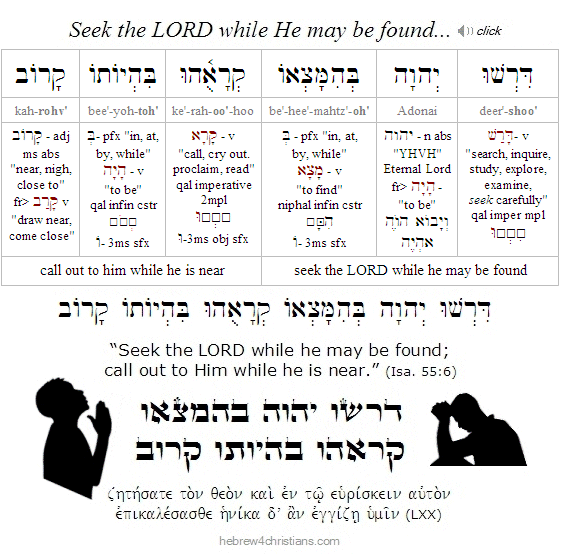|
THE THEME OF THE JEWISH HIGH HOLIDAYS is teshuvah (ū¬ų╝ų░ū®ūüūĢų╝ūæųĖūö), a word often translated as "repentance," though it's more accurately understood as turning back (shuv) to God. The root of this verb occurs nearly 1,000 times in the Hebrew Scriptures and first occurs when God told Adam he would "return to the earth" (Gen. 3:19). In spiritual terms, shuv may be regarded as a practical turning away from evil and a turning toward the good, though Jewish thinking regards turning to God as the means by which we turn away from evil. This act of turning has the power to redirect a person's destiny. It effects the whole life of the soul. As Abraham Heschel wrote, "No word is God's final word. Judgment, far from being absolute, is conditional. A change in man's conduct brings about a change in God's judgment" (Heschel: The Prophets, 194). In the ancient Greek translation of the Jewish Scriptures (i.e., the Septuagint, or LXX), shuv is translated using the word strepho (ŽāŽäŽüßĮ│ŽåŽē), which means to turn around, or to turn back to God.

A related word in Hebrew is nacham (ūĀųĖūŚųĘūØ), which is often associated with the emotion of regret (in the old King James Version of the Bible, nacham is sometimes confusingly translated using the word "repent"). Some linguists suggest that the root idea of the verb pictures God "taking a deep breath" (or even sighing) as way of expressing regret or feeling compassion in response to an offense by others. Thus we read, "And the LORD was sorry that he had made man on the earth (ūĢųĘūÖų╝ų┤ūĀų╝ųĖūŚųČūØ ūÖų░ūöūĢųĖūö ūøų╝ų┤ūÖųŠūóųĖū®ūéųĖūö ūÉųČū¬ųŠūöųĖūÉųĖūōųĖūØ ūæų╝ųĖūÉųĖū©ųČūź), and it grieved him to his heart" (Gen. 6:6). Speaking anthropomorphically, God "consoled himself" (nacham also means to comfort) by changing his thinking and plan. God's "regret" was His "answer" or response to the sinful choices of human beings.
Since it is absurd to say that God needs to repent from sin or that He morally regrets His actions, the meaning of nacham must be qualified when it is applied to man. Regret over sin is a state of sorrow that belongs exclusively to morally free human beings. Therefore the prophet Job uttered, "I abhor myself and repent (ūĀūŚūØ) in dust and ashes" (Job 42:6). In the ancient Greek translation of the Scriptures, the word nacham was usually translated using the word metanoia (╬╝╬ĄŽäßĮ▒╬Į╬┐╬╣╬▒) or sometimes ╬╝╬ĄŽä╬▒╬╝ßĮ│╬╗╬┐╬╝╬▒╬╣. Metanoia is a compound word that comes from '╬╝╬ĄŽä╬▒' (after, with) and '╬Į╬┐╬ĄŽē' (to think), which means "changing your thinking," (though it also can mean "going beyond (meta) your thinking" to access the realm of your heart). In other words, the word implies that how we think will affect how we make decisions (judgments), and therefore repentance means acknowledging that we are cognitively mistaken about the nature of reality (i.e., there is a divinely sanctioned moral order, and we are guilty of violating that order and in a state of profound alienation until we are divinely reconciled). Our change of mind - if genuine - will lead to a change of heart.

(As an aside, this implies that there is an "ethic of belief," or a moral imperative to believe the truth and reject error in the realm of the spiritual. God has wired us to be rational beings with a moral conscience and an intuitive perception of His reality. He also has revealed himself with "many proofs" (ŽĆ╬┐╬╗╬╗╬┐ß┐¢Žé Žä╬Ą╬║╬╝╬ĘŽüßĮĘ╬┐╬╣Žé) that demonstrate the victory of His salvation (Acts 1:3). The greatest mitzvah is exercising faith in God's redemptive love as revealed in the Messiah Yeshua. The LORD is always "calling" out to you to respond to His Presence...)
The Greek New Testament seems to follow the LXX by using the verb metanao (╬╝╬ĄŽä╬▒╬Į╬┐ßĮ│Žē) to express the Hebrew idea of nacham (i.e., regret or repentance), and it uses the verb strepho (ŽāŽäŽüßĮ│ŽåŽē) to express the practical idea of shuv (i.e., turning to God and away from evil). Metanao means expressing regret and remorse over the bankruptcy of our personal philosophy of how the world should be run. We surrender to God's truth, forsake the selfish demands of the ego, and "let God be God." Strepho, on the other hand, is a literal or metaphorical turning. When applied to God, it means turning all of your "heart, soul, and strength" back to Him. Indeed, the LXX exclusively uses this word to translate the Hebrew word shuv (ū®ūüūĢų╝ūæ), from which we get the word teshuvah. For example, "If you return, O Israel" is ūÉų┤ūØųŠū¬ų╝ųĖū®ūüūĢų╝ūæ ūÖų┤ū®ūéų░ū©ųĖūÉųĄū£ in the original Hebrew, but is translated as ß╝ÉßĮ░╬Į ß╝ÉŽĆ╬╣ŽāŽäŽü╬▒Žåß┐ć ╬ÖŽāŽü╬▒╬Ę╬╗ in the LXX (Jer. 4:1). Likewise, "Return, O Israel" is ū®ūüūĢų╝ūæųĖūö ūÖų┤ū®ūéų░ū©ųĖūÉųĄū£ in the Hebrew but is translated as in the ß╝ÉŽĆ╬╣ŽāŽäŽüßĮ▒Žå╬ĘŽä╬╣ ╬ÖŽāŽü╬▒╬Ę╬╗ in the LXX (Hos. 14:2). In a sense, we can say that nacham/metanao concerns the past (regret), whereas shuv/strepho concerns the present...
Traditional Christian theology tends to regard God in Greek, rather than Hebrew, terms. Historically speaking, most Christian theologians relied on the Greek translation of the Hebrew Scriptures rather than the original Hebrew to develop their theology. Indeed, the word "theology" itself is Greek (not Hebrew) and refers to the "study of God" (╬Ė╬ĄßĮ╣Žé + ╬╗ßĮ╣╬│╬┐Žé), implying that God is an "object" that could be looked at, "analyzed," and known as a "thing" or divine "substance." To the ancient Greeks, the idea of God is disclosed through a process of intellectual abstraction -- through "negative theology" (i.e., denying predicates of human language to the divine), and so on. The danger of regarding "repentance" as simply "changing your thinking" is that this can lead to intellectualism that is devoid of inward, heart transformation. Hence Evangelical Christianity has spawned an entire generation of those who accept "easy believism" and who tend to regard "repentance" as intellectual assent to the truths of the Gospel message (or to some creedal formula). Of course correct doctrine is vitally important, but it is emptiness if it is not passionately lived in one's experience. Ultimately, Christian truth is existential rather than academic. Yeshua's passion in the garden is greater than all the most profound thoughts of theology ever penned by the world's greatest theologians...
The general problem with repentance -- whether we regard it as a change of thinking or as a practical call to return to God - is that most people refuse to do it. In fact, no one can repent unless he or she is given the means to do so from heaven (John 6:44). We are born rebels who naturally hate God and His authority (Rom. 8:7). You can argue until you are "blue in face" with a sinner who needs to repent, but unless he or she is truly touched by God, the best possible outcome will be halfhearted resolutions and an incomplete reformation (Luke 11:24-26). Most parents who have children that have turned away from the LORD to embrace a sinful lifestyle know this to be true.... In this connection, repentance is analogous to spiritual rebirth that comes from God's direct intervention. Like genuine faith, the profound change in direction from the principle of self-centeredness to God-centeredness is a miracle from God.
While it is important that we "regret our thinking" (╬╝╬ĄŽä╬▒╬Į╬┐ßĮ│Žē) and embrace the authority of God as the first principle in all our reasoning (╬╗ßĮ╣╬│╬┐Žé ), it is equally important that we exercise our wills by turning to the LORD (ŽāŽäŽüßĮ│ŽåŽē) through acts of repentance (e.g., prayer, confession, turning away from sinful practices, offering tzedakah, and so on). According to Jewish tradition, genuine teshuvah involves four basic steps:
Four Steps of Teshuvah:
- Forsake the sin (Prov. 28:13). "Sincere repentance is demonstrated when the same temptation to sin, under the same conditions, is resolutely resisted" (Talmud Yoma 86b). Note that according to traditional Jewish views, the atonement is of no avail without repentance (Midrash Sifra). [shuv/strepho]
- Regret the breach in your relationship with God and others (Psalm 51). [nacham/metanoia]
- Confess the truth and make amends with those we have harmed (Prov. 28:13; 1 John 1:9; James 5:16, Matt. 5:23-4). Note that we must ask for mechilah (forgiveness from others) before receiving selichah (forgiveness from God). [shuv/strepho]
- Accept your forgiveness and move forward with the LORD through faith (Phil. 3:13-14; 1 John 1:9). Be comforted by the Presence of the LORD in your life: Nachumu: "Comfort ye my people" (Isa. 40:1). [nacham/metanoia].
Finally, it needs to be said that authentic repentance is a lifestyle, not a "one time deal." We never get past it. Although there is certainly spiritual progress as we walk in grace, all genuine progress comes through ongoing teshuvah. We may repent from a certain action at a given point in time, but that does not mean that no longer need to do teshuvah. Teshuvah is perpetual and timeless, since it corresponds to our spiritual rather than our temporal lives (i.e., chayei olam rather than chayei sha'ah). Indeed, a true penitent is called baal teshuvah (ūæų╝ųĘūóųĘū£ ū¬ų░ū®ūüūĢų╝ūæųĖūö), a "master of returning," who is always turning away from self and toward God. We never get beyond the call to "repent and believe the gospel" (Mark 1:15). That is why the season of teshuvah is always timely. The message of Elul and the High Holidays is meant to be carried over throughout the rest of the year.
ūōų╝ų┤ū©ų░ū®ūüūĢų╝ ūÖų░ūöūĢųĖūö ūæų╝ų░ūöų┤ū×ų╝ųĖū”ų░ūÉūĢ
ū¦ų░ū©ųĖūÉų╗ūöūĢų╝ ūæų╝ų┤ūöų░ūÖūĢų╣ū¬ūĢų╣ ū¦ųĖū©ūĢų╣ūæ
deer┬Ęshoo ┬Ę Adonai ┬Ę be┬Ęhee┬Ęmatz┬Ęoh
ke┬Ęrah┬Ęoo'┬Ęhoo ┬Ę bee┬Ęyoh┬Ętoh ┬Ę ka┬Ęrohv

"Seek the LORD while he may be found;
call upon him while he is near." (Isa. 55:6)
Hebrew Study Card

Click to listen and learn the Hebrew text:
 |
The passage continues: "Let the wicked man forsake his way (i.e, derekh: ūōų╝ųČū©ųČūÜų░), and the perverse man his thoughts (i.e., machshavah: ū×ųĘūŚų▓ū®ūüųĖūæųĖūö); and let him return (i.e., shuv: ū®ūüūĢų╝ūæ) to the LORD, that He may have compassion (i.e., rachamim: ū©ųĘūŚų▓ū×ų┤ūÖūØ) on him, and to our God, for he will abundantly pardon (i.e., selichah: ūĪų░ū£ų┤ūÖūŚųĖūö)" (Isa. 55:7).
Teshuvah and confession go hand in hand. Confession (ßĮü╬╝╬┐╬╗╬┐╬│ßĮĘ╬▒) means bringing yourself naked before the Divine Light to agree with the truth about who you are. Indeed, the word homologeo literally means "saying the same thing" - from ßĮü╬╝ŽīŽé (same) and ╬╗ßĮ╣╬│╬┐Žé (word). In Modern Hebrew teshuvah means an "answer" to a shelah, or a question. God's love for us is the question, and our teshuvah ŌĆō our turning of the heart toward Him ŌĆō is the answer. Teshuvah is one of the great gifts God gives each of us ŌĆō the ability to turn back to Him and seek healing for our brokenness. May we turn to Him now!
May we turn to Him now!
|






